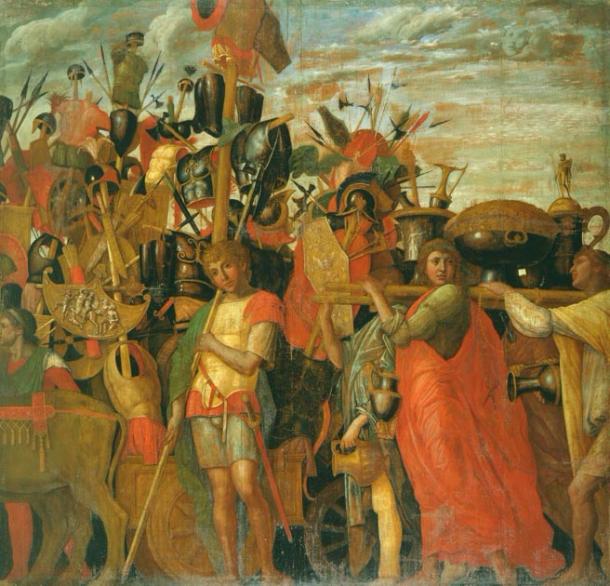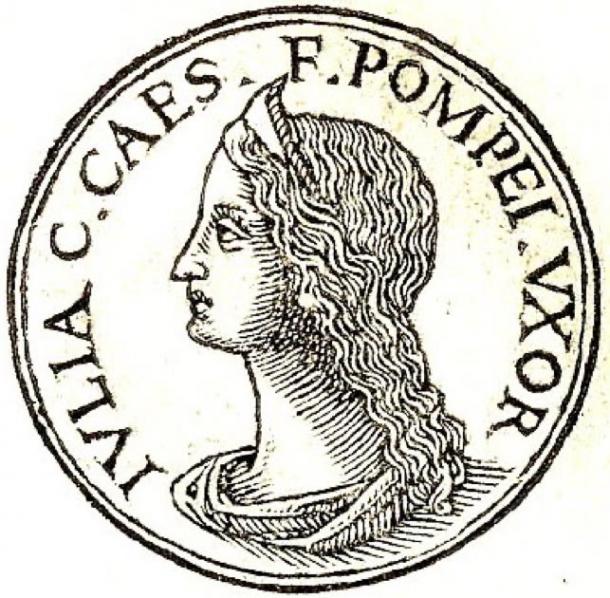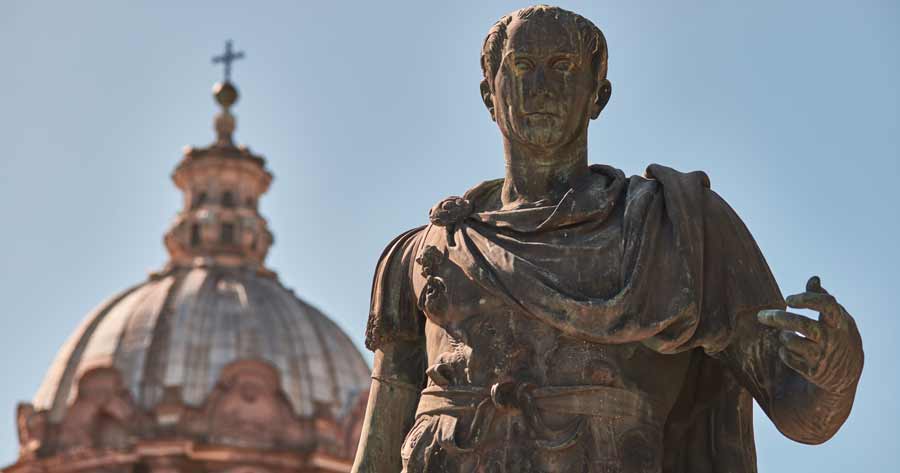The Deeds of Julius Caesar, Rome’s Greatest Son
There is hardly a more popular historical figure in the annals of ancient Rome, than one of its most distinguished generals and statesmen – Julius Caesar. The story of the man who managed to transform the fate of one of the world’s greatest states is captivating and inspiring to the last. A biography that is filled with ambition, intelligence, and the sheer ability to come out on top, the story of Caesar’s life is nothing short of an inspiration.
Today we are bringing you this story in detail – the full outlook on the life and deeds of Rome’s greatest son – Julius Caesar, and all the marvelous deeds that have remained in his wake, resounding through the entire world and shaping the history for centuries to come. So, “Cry havoc and let slip the dogs of war!” – Caesar conquers again!
Early Life and Influences of Julius Caesar
There is little information documented about the early childhood and life of Caesar. Born around 100 BC, to noble, patrician parents of the Julii gens, and the old stock of Latin nobles, the young Gaius Julius Caesar was from the get-go destined for great deeds.
It was a common future for boys born into fairly respected and well-off families to receive a good education and go on to serve with distinction in the military or politics. In fact, the men of the Julii gens were always involved in important political spheres of Rome, and, as future would show, young Gaius would surpass them all.
Tutored from early youth, Caesar quickly grasped the proper outlook on the world around him, showing an uncanny gift for all things strategic and political. Another important fact that could have contributed to Caesar’s growing ambitions in youth has to do with his uncle. In 112 BC, his aunt Julia married one of the most influential men of Rome in that time – Gaius Marius.
This extraordinary man was one of the finest military leaders of his age. An accomplished general, Gaius Marius led campaigns in Germania, Gaul, and Northern Africa. The leader of the Popular Party and a seven times consul, he also brought on very important military reforms, known as the Marian reforms.

Marius, Julius Caesar’s uncle, amid the ruins of Carthage. (DcoetzeeBot / Public Domain)
Marius also decided to help out Caesar’s father, his brother-in-law, also named Gaius Julius Caesar (the Elder), by making him the praetor (governor) of the Roman province of Asia. So, when Caesar the Elder went far to the east to govern, his young son was left to look up to none other than his accomplished uncle – Gaius Marius.
In the coming years, young Caesar quickly became involved with the affairs of his uncle. When Julius Caesar the Elder died in the east, his young son was left as the head of the influential Julii family at age 16. At this time, his uncle Gaius Marius was embroiled in a power struggle and civil war with his conservative rival Lucius Cornelius Sulla.
Wishing to cement his alliance with the Julii, and place them firmly on their side, Gaius Marius arranged an influential marriage for young Julius Caesar, and also made him the High Priest of Jupiter. And thus, Caesar was officially thrust into the political struggles and the incessant vying for power in the Roman Republic.
But when his uncle lost against his rival Sulla, Caesar found himself on the losing side. Targeted as the enemy of Sulla, he was forced into hiding, but eventually pardoned after continued pleas and appeals from his relatives.
Still, he was stripped from his official titles and from his priestly position. The loss of priesthood meant that new paths were available for 18 year old Caesar and he promptly chose a military career.
Caesar as Orator, Advocate, and Quaestor
His first military years went on without any major occurrences. He served with distinction in campaigns in Cilicia and Asia and had earned “his spurs” – a high military decoration, the Civic Crown – for his actions in the Siege of Mytilene in 81 BC. He was also involved in an important mission in Bythinia, spending time in the court of King Nicomedes IV Philopator.
- How the Light of the Wives of Julius Caesar Was Dimmed by an Egyptian Lover
- Famous Figures & Omens: Julius Caesar
- First Hard Evidence for Julius Caesar's Invasion of Britain Discovered

The triumphs of Caesar - bearers of trophies and bullion. (Mathsci / Public Domain)
He eventually returned to Rome, in 78 BC, but as he was stripped of his former possessions by Sulla, he had to settle in the lower class district of the city. He then got involved in oratory and legal advocacy and gained some reputation after steadfastly prosecuting corrupt former officials. One such prosecution was against the ex-governor of the Macedonia province, Gnaeus Cornelius Dollabella.
During the trial, Caesar delivered one of the finest orations of the period, but even so, he lost the case. Regardless, he had solidified his place in the Roman society, exemplifying himself as a first class orator and a promising politician. This career of advocacy was cut short by his return to military duty, which he spent again in Asia quelling an unrest.
When he once more returned to Rome, he at last fully entered into the political life of Rome. Sulla, his enemy, was dead for almost a decade by then. As the first step towards a great political career, Caesar got elected as a military tribune, and then as a quaestor, in 69 BC. A quaestor was tasked with overseeing very important tasks for Rome, and Caesar managed to make his service in the Hispania Ulterior province.
He would serve as quaestor further in Spain under the watchful eye of governor Gaius Antistius Vetus. Once there, his tasks involved traveling around distant Roman communities and towns of Spain, settling minor disputes and serving as a mediator on all manner of issues. This helped him establish a good reputation with the Roman citizens of the far province – something that would serve him in later years.
A major breakthrough for Caesar happened in 59 BC, when he won consulship, against all odds. At the time there was a growing struggle between two major political figures – Gnaeus Pompey Magnus and Marcus Licinius Crassus. Caesar, who was indebted to both of them, found himself in the middle and tried to reconcile the feuding parties.
This would result in the forming of an alliance between the three of them, a cardinal event for the future of the Roman Republic. The informal alliance was known as the First Triumvirate and was basically a deal between the three men to help one another in their rising to power. The triumvirate quickly went awry.

The First Triumvirate - Gaius Julius Caesar, Marcus Licinius Crassus, and Gnaeus Pompeius Magnus. (Azrael42 / Public Domain)
Caesar, after proposing a law that would redistribute public lands to Rome’s poor, was openly supported by both Pompey and Crassus – which made it obvious that the three were allied. Caesar’s co-consul, Marcus Calpurnius Bibulus tried to informally veto the law, and was chased out of the forum by armed men of Caesar’s – a daring and unheard of move.
Rome’s laws were centered on shared administration as to prevent a single man to rise above all others in absolute power. And the deeds of Caesar were against those laws from the very beginning. After the expulsion of his co-consul from the forums, Caesar’s critics jokingly proclaimed that year as the “consulship of Julius and Caesar”, unknowingly offering a glimpse into the future to come.
Caesar’s Conquest of Gaul
After his one year as consul was finished, Caesar once again managed to bypass Roman laws, using his political allies to gain the governance of provinces of Illyricum, Transalpine Gaul, and Cisalpine Gaul. This governorship was prolonged to five years, when a single year was commonplace. Governing a province – or in this case, three – was a lucrative position, and also gave Caesar direct command over four Roman legions – Legio VII, VIII, IX, and X - significantly furthering his power.
Caesar quickly became involved in the developing affairs in Gaul – where he set about to conquering the feuding Gallic tribes. He first defeated the Tigurines and other Helvetii, then the Sequani and Arverni, and subsequently Latobriges, Atrebates, Virumandui, and many other tribes.

Vercingetorix, a Gallic tribe leader, throws down his arms at the feet of Julius Caesar. (Hohum / Public Domain)
Several tribes allied with Rome, and Caesar was actively involved in the inter-tribal relations and conflicts, often using them for his own gain. He marched against the Belgae, and had considerable difficulty defeating the fierce tribe of Nervae – who were renowned for their extreme adherence to savage warfare.
During the period Caesar led several punitive campaigns – retaliatory offensives that were aimed at avenging swift and savage attacks against Roman garrisons. In the process, the Romans nearly exterminated several Belgic tribes.
In the end, the whole Gallic campaign lasted around 8 years and was collectively known as the Gallic Wars. It was Caesar’s major success and greatly expanded the boundaries of the Roman Republic.
All the while, things back in Rome were not the best. The Triumvirate was falling apart, threatening instability and possible civil war. This began with the death of Crassus, who failed terribly in his campaigns in the east. This left only Pompey and Caesar, who were growing increasingly alienated.
When Caesar’s daughter, Julia, who was married to Pompey, died at childbirth, the two men were finally set apart. In time their diverging political paths made them open rivals, and the men loyal to them openly feuded and plunged Rome into further chaos. These were Caesar’s plebeian Populares faction and Pompey’s conservative Optimates. Civil war was looming.

Julia from Promptuarii Iconum Insigniorum. The inscription reads: "Julia; Gaius Caesar's daughter; Pompey's wife”. (Hannah~commonswiki / Public Domain)
This escalated in 50 BC, around the end of the Gallic conquests, when the Senate which Pompey led, ordered Julius Caesar to disband his legions and return to Rome, where he would be tried for treason. The truth behind this was the fact that they greatly feared Caesar, who gained considerable power and was loved by the lower classes.
But, instead of obeying the order of the Senate, Caesar chose another option – he marched his legions across the River Rubicon and into Italy – an act that was unthinkable and meant war. This happened in January 49 BC and was the start of a four year long civil war.
Caesar’s Civil War and the Final Demise of Pompey
Outnumbered and with inexperienced troops, Pompey and his men retreated further south, avoiding early confrontation with Caesar and his seasoned troops. But Caesar didn’t stay put. He left the governance of Italy to his trusted aide Mark Antony and began a series of marches in pursuit of his enemies.
First he went to Spain, and then to Illyria, where the first big battle was fought at Dyrrachium, which was a surprising loss for Caesar. But soon after in 48 BC, Caesar managed a crushing victory against a superior enemy, routing Pompey’s forces and turning the tide of the civil war for good. Utterly defeated, Pompey was forced to disguise himself and flee.
He sought refuge in Ptolemaic Egypt, but upon his arrival there, he was promptly executed. The rest of Caesar’s opponents were defeated in the year 45 BC at the Battle of Munda. As his victories piled up, Caesar was proclaimed a dictator for 10 years – giving him full authority of the state.
- When Julius Caesar Was Kidnapped by Pirates - And Made Them Increase the Ransom!
- Banished by Caesar and Executed by Mark Antony: Did the Charismatic ‘Grandson of Gaius Marius’ Have a Legitimate Claim to the Roman Empire?
- Rome’s Forgotten General: Upstart Poor Boy Becomes Military Conqueror – Part I

Caesar's campaign to Munda. (Historicair / CC BY-SA 3.0)
During the few years of civil war and the short period after it, Caesar worked actively at establishing several reformations of laws and the layout of the governance of the realm. Without any significant public opposition, and loved by the common folk, he was showered by titles and triumphs by the Senate.
Some of these titles were radical – like Imperator and Father of the Fatherland. This culminated with him being appointed the dictator perpetuo rei publicae constituendae, or “perpetual dictator”. All of this pointed to almost monarchic rule by Caesar, which the Roman senators of the Optimates faction and the elite greatly feared. Caesar was at the absolute height of his power, and everything pointed to the eventual dissolution of the Roman Republic and the creation of an Empire – with his sole rule.
Ista Quidem Vis Est! – Caesar Assassinated
All of this led to a conspiracy against Caesar. It was led by several Optimate senators, chief of which were Decimus Junius Brutus Albinus, Marcus Junius Brutus, Gaius Cassius Longinus, Lucius Tillius Cimber, Publius Servilius Casca Longus, and several other prominent figures. They conspired to assassinate the dictator and made a plan.
On Ides of March (15th) in 44 BC, as Caesar arrived at the Senate, Cimber approached him with a pretense of some vague petition. When Caesar dismissed his petition, Cimber proceeded to roughly pull down Caesar’s toga (dress), to which a surprised Caesar exclaimed: “Ista quidem vis est!” – “Truly, this is violence!” .
In the ensuing commotion, with the conspiring senators all around him, Casca cast the first blow with his dagger, which Caesar avoided. But within moments, the entire group of conspirators were stabbing Julius Caesar at the Senate steps.
He received 23 stab wounds and expired on the spot, likely from blood loss. Most contemporary writers of Rome claim that Caesar either said nothing, or simply uttered “You too, child?” upon seeing his friend Marcus Junius Brutus among the killers.

The assassination of Julius Caesar. (Hohum / Public Domain)
Caesar’s Death Was a Spark – The Aftermath
Contrary to the wishes of the conspirators, the death of Caesar only increased the demise of the Roman Republic. The common people were angered by the loss of the ruler they loved. Their anger threatened to spill over into a full-fledged riot, which almost occurred at Caesars funeral, when the crowds caused the funeral pyre to grow out of control and seriously damage the Forum.
In the aftermath of the assassination, Caesar’s would be heir Mark Antony, and the legitimate heir Gaius Octavius feuded, leading to a new civil war and more clashes. In the end, the downfall of the Roman Republic could not be staved off. Caesar’s heir, Gaius Octavius, who was considered a Divi Filius – Son of God – since Caesar was deified after his death, would be proclaimed an Imperator in 27 BC, becoming the first emperor of the Roman Empire.
But it is without a doubt that Julius Caesar, one of Rome’s greatest sons, whose ambition and skill was unsurpassed, changed the pages of history for good – and became one of the most important figures in the history of ancient Rome.
Top image: Statue of Julius Caesar / Adobe Stock
References
Abbott, J. 1849. History of Julius Caesar. Gutenberg.
Canfora, L. 2007. Julius Caesar, the Life and Times of the People’s Dictator. University of California Press.
Crompton, S. 2013. Julius Caesar. Infobase Learning.
Freeman, P. 2008. Julius Caesar. Simon & Schuster.
Gelzer, M. 1968. Caesar: Politician and Statesman. Harvard University Press.
Stevenson, T. 2015. Julius Caesar and the Transformation of the Roman Republic. Routledge.
Thorne, J. 2003. Julius Caesar: Conqueror and Dictator. Rosen Central.
Wiseman, T. 2018. Julius Caesar, Roman General. Cavendish Square.
Wyke, M. 2006. Julius Caesar in Western Culture. Blackwell Publishing.



















